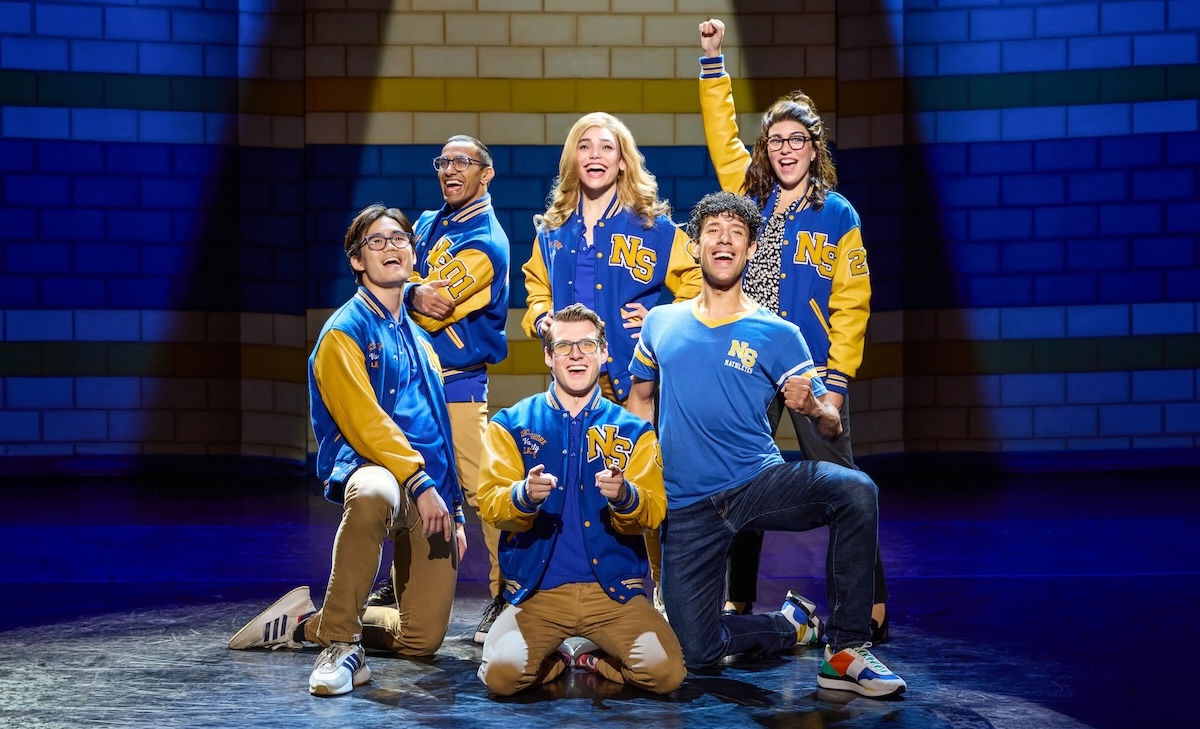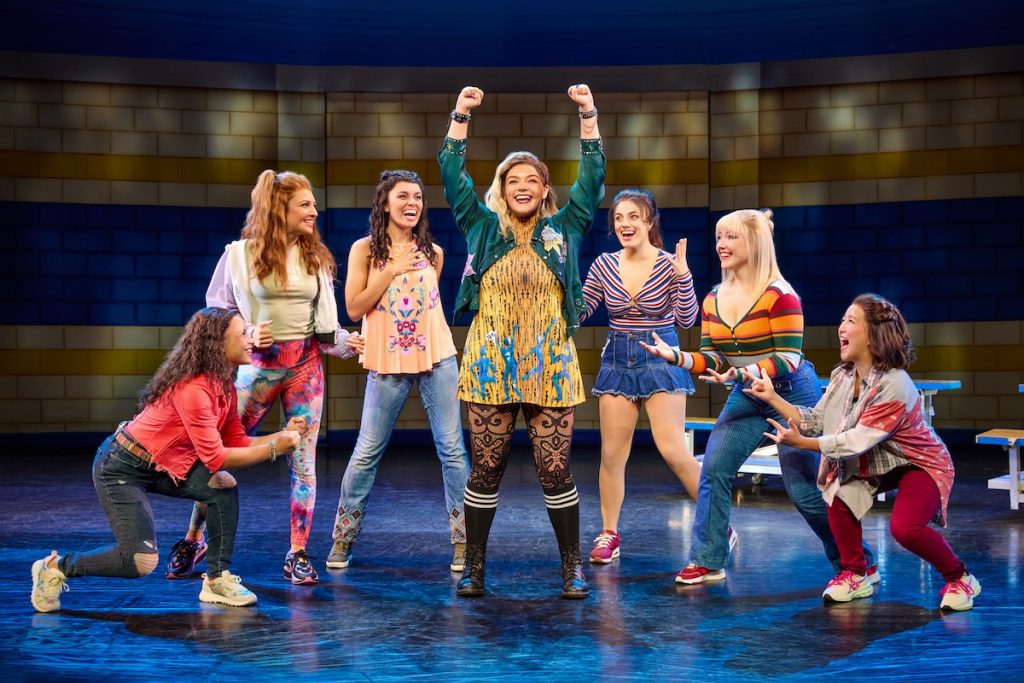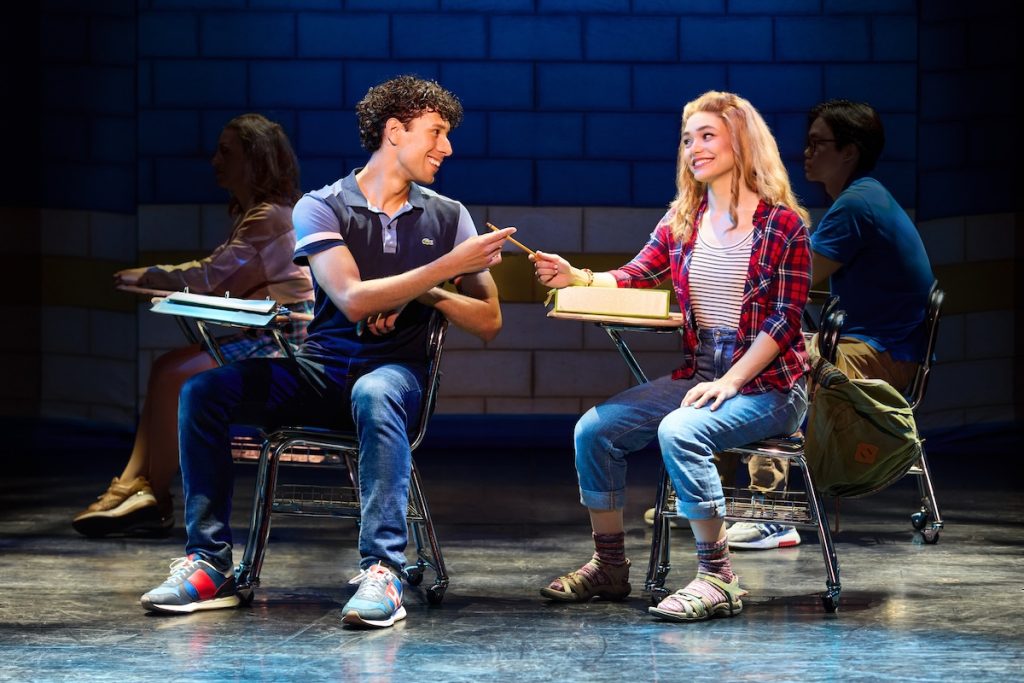Go Fetch: ‘Mean Girls’ comes to the Granada

It’s been 20 years since Mean Girls gave us a telling and hilarious glimpse at social cliques in high schools, gave us The Plastics, and made Lindsay Lohan a star. The musical version of the madness, adapted by Tina Fey from her script for the film, was nominated for 12 Tony awards in 2018, including Best Musical, and is just now coming our way. This mere months after a new film version of the stage musical – yeah, you read that right – hit screens last year.
The story follows Cady, who grew up being homeschooled on an African savanna, encountering even more wild and vicious animals in her new high school in suburban Illinois. Cady finds herself torn between hanging out with nerdy new friends and joining The Plastics, the top rung on the social ladder, with her choices coming back to haunt her.
American Theatre Guild’s Broadway in Santa Barbara series touring production of Mean Girls plays at the Granada Theatre on January 8 and 9, just six weeks after the performances of the previous series show, Clue. The stage adaptation features music by three-time Emmy winner Jeff Richmond (Fey’s husband), lyrics by two-time Tony nominee Nell Benjamin, and original direction and choreography by two-time Tony winner Casey Nicholaw. In a quirky coincidence, both shows are tour directed by veteran Casey Hushion, whose other credits include Murder on the Orient Express, Beautiful: The Carole King Musical, The Cher Show and many others, including an upcoming adaptation of another cult film in Mystic Pizza.
Hushion shared her thoughts over the phone from a rehearsal break for Pizza in Vero Beach, Florida.
Q. I absolutely loved Clue, which was so fast-paced with such clever set design and movement choreography. You were the original director of the show, so I just want to ask you about what went into making it work the way it does as such a fast-paced marvel?
A. The precision and the rhythms and the timing was the heart of how Clue was handled because what made it so interesting is that it’s both a murder mystery and a farce. Both of those genres require meticulous precision and detail for them to succeed, and putting them together makes it double that, which was an exciting challenge to find the language of how that could work and to heighten the theatricality. We had so much fun discovering how they would move through the house, how you could create a set in which they moved to 13 different rooms in one night without losing any of the tension in any of the speed and momentum of the show. It completely found its own vocabulary of how it moves.
We ended up designing the show very much in tandem with the book writer and the set designer, with the writing and designing adapting to what we were shaping. The set almost becomes like a Swiss Army knife and a character in the show itself.

You’re also the tour director for Mean Girls, adapted from another popular movie with cult followings. But where Clue was a taut 90 minutes, Mean Girls is even longer than the movie at two and a half hours. But it’s also received great reviews. What’s the commonality in your approach?
I do have to clarify that my title on Mean Girls is really associate director, which means the vision, the original version, the choreography and the staging come from Casey Nicolaw, not me. But he’s someone I worked with for 20-plus years who is a great mentor and a close friend of mine, and I was around from the very first table read throughout the whole process and many, many years of the show. But where Clue was my original creation, my job here is to uphold the vision of what he created.
To your question, the key to all of these adaptations succeeding is learning how to capture the essence of what people most love and respond to about the original material, but then to take that essence and transform it into something that is new and really stage worthy and feels natural in a theatrical setting. So it’s really about making sure the audiences get what they’re coming to see, but also finding ways to surprise them and ways to do it differently.
Can you share more about how you do that, particularly for Mean Girls?
Adapted pieces tend to fall flat when you just try to put the film on stage and recreate that. What works is being judicious and knowing which lines and which moments you absolutely must give to the audience. When you have those core moments, then you can create something new that makes it a musical. I remember watching Casey create the number, “Where Do You Belong?” He had index cards on the floor with people’s names written on and was kind of spinning them and moving them and developing and coming up with this very original idea of how to take that moment in the cafeteria and make it into a huge musical number. It’s so successful because it’s entirely different, but it’s still in the style of and in the world of what the film represents. He found a way to make this massive Broadway production number out of it while staying true to the spirit.
Some folks have issues with the way musicals seem to suddenly break into a number in a way that makes no sense. How did you avoid that, and make something more seamless?
It has to come from a truthful place. People are allergic to musicals when they feel phony and corny. To me, both Mean Girls and Clue have the comedic taste come from honest characters in real circumstances, even with different approaches. The funniest things are jokey ones, but the ones that come from character and circumstance. I think that’s the common thread in the shows I work on.

How does that show up on Mean Girls?
Essentially the show is about treating each other with respect and with dignity, even when we have our differences. It’s bigger than high school – all of the behaviors that you see in the show play out in adult circumstances over and over. It’s really relatable and it’s very accessible, and in my opinion, very apropos for our current moment. It’s great that you’re laughing and getting entertained with these musical numbers and big moments, but at the end of the day, that message is clear: Can we all just respect each other, communicate and work through our differences?
Has the show changed over the years as the world evolves?
The creative team has been continuously rewriting, updating, tweaking the show, with every incarnation, every tour, every version that goes out. It’s so cool that the creative team stays committed to continuing to build on the show and improve it. We just did a version in London on the West End, and it’s entirely different from any other Mean Girls we did before.
What about the version we’re seeing in Santa Barbara, which is part of a non-equity tour?
It’s not an easy show to cast because the requirements are really high, especially for the principals who have to be incredible, almost stunt singers for the vocal range that they cover, but also really excellent actors to convey the subtlety and nuance and complexity. They have to understand the rhythms of the comedy, but also be able to deliver the heart of the show and to belt their faces off on the songs. The non-equity cast has been great because they’re all age-appropriate, so they get the show’s world and culture just by their youth. A lot of them are right out of high school and just lived through these kinds of experiences. In fact, we have to work hard to not allow cliques to happen with the cast members and not let the culture of the show creep into the company.
Any final thoughts?
These characters and the comedy and the message of the film just translate really beautifully to the stage, a natural home for the story. The message seems more relevant than ever. So it really does feel like it belongs out there in the world at this moment







You must be logged in to post a comment.